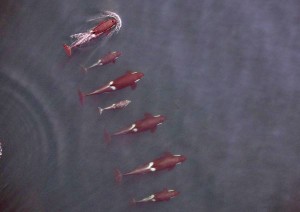Friday, September 4, 6:30 p.m., Whale Museum
Using a Small Unmanned Hexacopter to Non-invasively Monitor the Health of Resident Killer Whales
— from Jenny Atkinson —
 The Whale Museum is pleased to welcome John Durban as part of the 2015 Summer Lecture Series on Friday, September 4th at 6:30 p.m. Dr. Durban will give an overview of his research and collaborations using photogrammetry to fill key data gaps that currently constrain the conservation of Northern and Southern Resident killer whales in the US and Canada: specifically measuring whale growth and body condition to assess whether the abundance of their chinook salmon prey is low enough to cause nutritional stress and impair reproduction.
The Whale Museum is pleased to welcome John Durban as part of the 2015 Summer Lecture Series on Friday, September 4th at 6:30 p.m. Dr. Durban will give an overview of his research and collaborations using photogrammetry to fill key data gaps that currently constrain the conservation of Northern and Southern Resident killer whales in the US and Canada: specifically measuring whale growth and body condition to assess whether the abundance of their chinook salmon prey is low enough to cause nutritional stress and impair reproduction.
Currently this work involves the use of a small unmanned hexacopter to non-invasively collect images from 100 ft above the whales to assess the health of individuals. John will also discuss his use of this technique to study blue whales, gray whales and humpback whales, but will focus mainly on his current research on Southern Resident killer whales around the San Juan Islands and Northern Resident killer whales in Johnstone Strait. Authorized by permits and airspace clearances in both the US and Canada, this work addresses key elements of conservation plans in both countries that are aimed at maintaining adequate food supplies for these protected populations.
The September 4th lecture is free and open to the public. For more information, call (360) 378-4710 ext. 30. The Whale Museum is located in Friday Harbor at 62 First St. N.
Founded in 1976, The Whale Museum’s mission is to promote stewardship of whales and the Salish Sea ecosystem through education and research. In addition to providing exhibits, the Museum also provides programs including the Marine Naturalist Training, Orca Adoption Program, Soundwatch Boater Education, San Juan Islands Marine Mammal Stranding Network, and the Whale Hotline. The Whale Museum can be found on-line at www.whalemuseum.org.
# #
**If you are reading theOrcasonian for free, thank your fellow islanders. If you would like to support theOrcasonian CLICK HERE to set your modestly-priced, voluntary subscription. Otherwise, no worries; we’re happy to share with you.**







